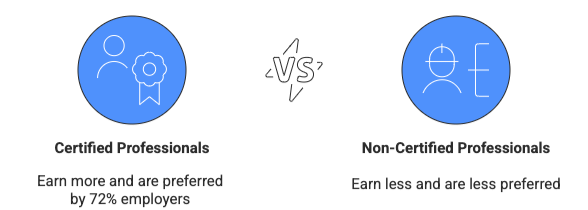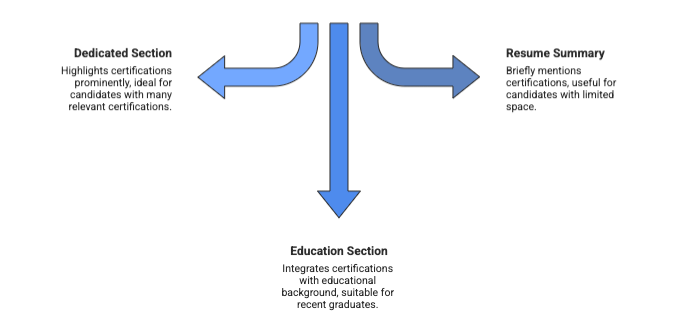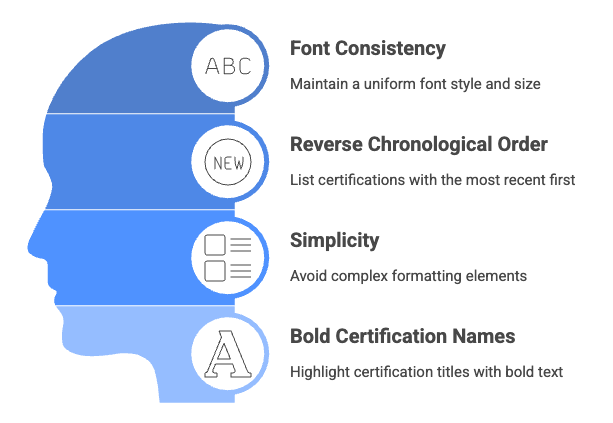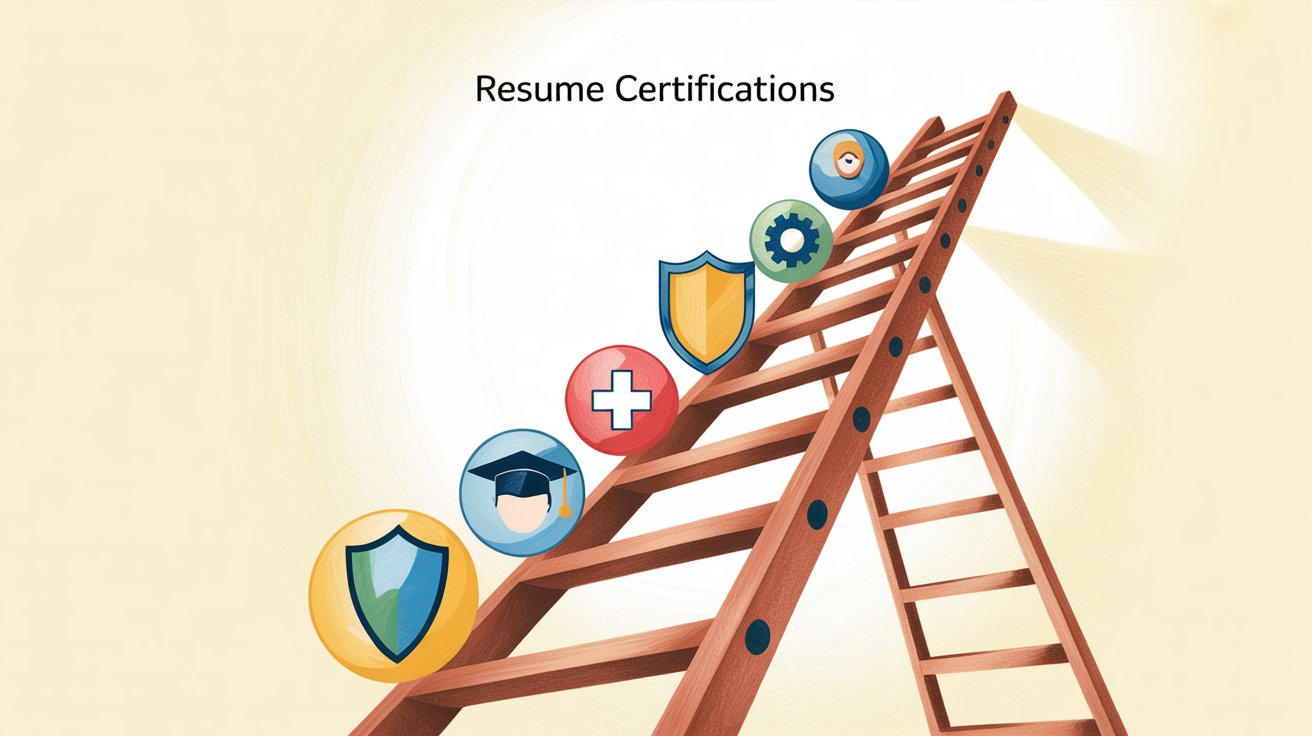TLDR:
- Certifications are validated by third parties and can boost your salary by 15-20%
- Create a dedicated section if you have 3+ certifications; add them under education if you have 1-2; or mention them in your summary if they’re critical requirements
- Include the full certification name, issuing organization, date earned, and any license numbers
- Only include relevant, current, industry-required certifications (like CPA, RN, PMP); skip expired ones and irrelevant online course completions
Certifications prove you have specialized skills and meet industry standards. Unlike self-reported skills, certifications are validated by third-party organizations, making them concrete evidence of your expertise.
When certifications are essential:

They’re legally required for the role. Healthcare, finance, legal, and skilled trades often require specific certifications or licenses. Without them, you can’t legally perform the job. Examples include RN licenses for nurses, CPA for accountants, and CDL for commercial drivers.
They demonstrate valuable skills. Even when not mandatory, certifications can set you apart from other candidates. A Project Management Professional (PMP) certification shows leadership capability. AWS certifications prove cloud computing expertise. Google Analytics certification validates digital marketing skills.
You’re new to the field or changing careers. If you lack direct experience, certifications fill the gap by showing you’ve invested time in formal training. A recent graduate with a Google Data Analytics certificate or a career changer with a coding bootcamp certification can prove they have job-ready skills despite limited work history.
The data supports this: 72% of employers prefer candidates with relevant certifications, and certified professionals earn 15-20% more on average than their non-certified peers in the same roles.
In this guide, you’ll learn:
Where to Place Certifications on Your Resume?
The best placement depends on how important your certifications are to the target role. Here are the three main approaches:

Option 1: Create a Dedicated Certifications Section
Most professionals with multiple certifications should use a standalone section. This makes your credentials easy to find and shows commitment to professional development.
When to use this approach:
Where to place it:
Example certifications section for a project manager:
CERTIFICATIONS
Project Management Professional (PMP)
Project Management Institute | Issued: June 2023
Certified Scrum Master (CSM)
Scrum Alliance | Issued: January 2022
Google Project Management Certificate
Coursera | Issued: August 2021
Option 2: Add Certifications to Your Education Section
Combine certifications with education if you only have one or two credentials, or if they were earned as part of your degree program. This keeps your resume concise without creating a thin standalone section.
When to use this approach:
Example combined education section:
EDUCATION
Bachelor of Science in Computer Science
University of California, Berkeley | Graduated: May 2024
AWS Certified Solutions Architect – Associate
Amazon Web Services | Issued: September 2025
Option 3: Mention Certifications in Your Resume Summary
If a certification is a major job requirement or your most impressive credential, reference it in your resume summary to immediately show you’re qualified.
When to use this approach:
Example summary for a registered nurse:
SUMMARY
Registered Nurse (RN) with 5+ years of experience in critical care settings. Certified in Basic Life Support (BLS) and Advanced Cardiovascular Life Support (ACLS). Skilled in patient assessment, care planning, and collaboration with multidisciplinary teams.
Note: You should still list the full certification details in a dedicated section or your education section. The summary just highlights it.
How to Format Certifications on Your Resume?
Consistent, professional formatting helps recruiters quickly identify your credentials.
What to Include in Each Entry
Every certification should include these four elements:
Formatting Examples
Basic format:
Copied!Certified Public Accountant (CPA) American Institute of CPAs | Issued: June 2025
With credential ID:
Copied!Certified Information Systems Security Professional (CISSP) (ISC)² | Issued: January 2025 | License: 654321
With expiration date:
Copied!AWS Certified Solutions Architect – Associate Amazon Web Services | Issued: August 2024 | Valid through: August 2026
In-progress certification:
Copied!Chartered Financial Analyst (CFA) Level II CFA Institute | Expected completion: June 2026
Formatting Best Practices

Use a consistent font. Match the font style and size (typically 10-12 pt) with the rest of your resume. Stick with professional fonts like Arial, Calibri, or Times New Roman.
List in reverse chronological order. Put your most recent certification first, unless you’re prioritizing by relevance instead of date.
Keep formatting simple. Use plain text without tables, text boxes, or graphics. This ensures your resume stays readable by both Applicant Tracking Systems and recruiters.
Bold certification names. Make the certification title stand out by using bold text, especially in a dedicated certifications section.
Which Certifications to Include (and Skip) On Your Resume?
Not every certificate you’ve earned deserves space on your resume. Be strategic.
Always Include These
Professional certifications required or preferred in your industry:
Technical certifications from recognized vendors:
Industry-specific credentials that demonstrate specialized knowledge:
Government certifications and licenses:
Language proficiency certifications (when relevant):
Skip or Downplay These
- Expired certifications. Either renew them or remove them. Listing expired credentials raises questions about your commitment to staying current.
- Irrelevant certifications. If it doesn’t relate to your target role, leave it off. Your yoga instructor certification doesn’t belong on your software engineering resume unless you’re applying to a wellness tech company.
- Basic online course certificates unless they’re from recognized universities or address specific job requirements. Certificates from Coursera, Udemy, or LinkedIn Learning show initiative but carry less weight than professional certifications. If you include them, create a separate “Professional Development” section.
- Outdated basic skills certificates. “Microsoft Office Specialist” certification doesn’t add value for experienced professionals where these skills are assumed.
important Certifications to Add To Your Resume
Different fields value different credentials. Below you will find a list of top certifications that will give you an edge when looking for a job in that industry.
- Technology & IT
- Healthcare
- Project Management & Business Analysis
- Finance & Accounting
- Human Resources
- Marketing & Analytics
- Education & Teaching
- Legal
- Real Estate
- Quality Assurance & Testing
- Design & Creative
- Fitness & Wellness
- Skilled Trades & Manufacturing
- Transportation & Logistics
Technology & IT
Cloud Computing
AWS Certified Solutions Architect – Associate | Amazon Web Services: Validates your ability to design and deploy scalable, highly available systems on AWS infrastructure.
AWS Certified Solutions Architect – Professional | Amazon Web Services: Demonstrates advanced expertise in designing complex AWS applications and migrating workloads to the cloud.
Microsoft Certified: Azure Fundamentals | Microsoft: Confirms foundational knowledge of cloud services, Azure architecture, and security principles for cloud computing.
Microsoft Certified: Azure Administrator Associate | Microsoft: Shows proficiency in implementing, managing, and monitoring Azure environments for enterprise solutions.
Google Cloud Professional Cloud Architect | Google Cloud: Proves expertise in designing, developing, and managing robust, secure cloud solutions on Google Cloud Platform.
Cybersecurity
Certified Information Systems Security Professional (CISSP) | (ISC)²: Industry-standard certification showing comprehensive knowledge of cybersecurity principles, risk management, and security architecture.
Certified Ethical Hacker (CEH) | EC-Council: Demonstrates skills in ethical hacking and penetration testing to identify and fix security vulnerabilities.
CompTIA Security+ | CompTIA: Validates baseline cybersecurity skills including threat detection, network security, and cryptography fundamentals.
Certified Information Security Manager (CISM) | ISACA: Proves expertise in managing and governing enterprise information security programs at a strategic level.
Networking & Infrastructure
CCNA (Cisco Certified Network Associate) | Cisco: Shows networking proficiency in routing, switching, security, and wireless technologies for managing IT infrastructure.
CCNP (Cisco Certified Network Professional) | Cisco: Demonstrates advanced skills in planning, implementing, and troubleshooting complex enterprise network solutions.
CompTIA Network+ | CompTIA: Validates essential networking skills including network configuration, troubleshooting, and infrastructure management.
CompTIA A+ | CompTIA: Proves foundational IT skills for troubleshooting, maintaining, and supporting hardware, software, and networks.
Software Development & Programming
Certified Entry-Level Python Programmer (PCEP) | Python Institute: Confirms understanding of Python fundamentals and ability to solve basic programming challenges.
Oracle Certified Professional, Java SE Programmer | Oracle: Demonstrates proficiency in Java programming for building enterprise applications and software solutions.
Salesforce Certified Administrator | Salesforce: Shows ability to configure and manage Salesforce environments, including automation, data management, and user setup.
Microsoft Certified: Power Platform Fundamentals | Microsoft: Validates knowledge of Microsoft’s low-code platform for building business applications and automation workflows.
Healthcare
Nursing & Patient Care
NCLEX-RN (National Council Licensure Examination) | NCSBN: Required license for registered nurses, testing nursing knowledge and clinical judgment for safe patient care.
NCLEX-PN (Practical Nurse Examination) | NCSBN: Required license for licensed practical nurses and vocational nurses to practice nursing under supervision.
Certified Nursing Assistant (CNA) | State Boards of Nursing: Entry-level certification for providing basic patient care including bathing, feeding, and mobility assistance.
Basic Life Support (BLS) | American Heart Association: Certifies healthcare professionals in CPR, AED use, and emergency response techniques for cardiac and respiratory emergencies.
Advanced Cardiovascular Life Support (ACLS) | American Heart Association: Advanced certification for managing cardiac arrests, stroke, and other life-threatening cardiovascular emergencies.
Pediatric Advanced Life Support (PALS) | American Heart Association: Specialized training in recognizing and treating critically ill or injured infants and children.
Allied Health
Certified Medical Assistant (CMA) | American Association of Medical Assistants: Validates clinical and administrative skills for supporting physicians in outpatient care settings.
Registered Dental Hygienist (RDH) | State Dental Boards: Required license for performing dental cleanings, taking x-rays, and providing preventive oral health care.
Physical Therapist (PT) License | State Licensing Boards: Required license for evaluating and treating patients with movement disorders and physical injuries.
Emergency Response
Emergency Medical Technician (EMT) Certification | NREMT: Certifies basic life support skills for providing emergency medical care and patient transport.
Paramedic Certification | NREMT: Advanced certification for administering medications, performing advanced procedures, and managing critical emergencies.
Project Management & Business Analysis
Project Management
Project Management Professional (PMP) | Project Management Institute: Gold standard certification demonstrating comprehensive project management expertise, leadership skills, and strategic thinking across industries.
Certified Associate in Project Management (CAPM) | Project Management Institute: Entry-level certification validating foundational project management knowledge and terminology for aspiring project managers.
Certified ScrumMaster (CSM) | Scrum Alliance: Proves understanding of Scrum framework, Agile methodologies, and ability to facilitate Scrum teams effectively.
PMI Agile Certified Practitioner (PMI-ACP) | Project Management Institute: Demonstrates expertise in Agile practices, tools, and techniques beyond just Scrum methodology.
PRINCE2 Foundation & Practitioner | AXELOS: Internationally recognized project management methodology certification popular in Europe and government sectors.
Google Project Management Professional Certificate | Coursera: Covers foundational project management skills including Agile, Scrum, and risk management for entry-level roles.
Business Analysis
Certified Business Analysis Professional (CBAP) | IIBA: Advanced certification showing expertise in business analysis, requirements management, and process improvement strategies.
Certification of Capability in Business Analysis (CCBA) | IIBA: Mid-level certification demonstrating practical business analysis skills and techniques for analyzing organizational needs.
PMI Professional in Business Analysis (PMI-PBA) | Project Management Institute: Validates business analysis expertise specifically within project environments and requirements gathering.
Process Improvement
Lean Six Sigma Green Belt | ASQ or IASSC: Demonstrates proficiency in data-driven process improvement, statistical analysis, and waste reduction methodologies.
Lean Six Sigma Black Belt | ASQ or IASSC: Advanced certification proving expertise in leading complex improvement projects and mentoring Green Belt practitioners.
Certified in Production and Inventory Management (CPIM) | ASCM: Shows expertise in production planning, inventory management, and supply chain optimization strategies.
Certified Supply Chain Professional (CSCP) | ASCM: Demonstrates comprehensive knowledge of end-to-end supply chain management from sourcing to delivery.
Finance & Accounting
Accounting
Certified Public Accountant (CPA) | AICPA: Essential certification for public accounting, demonstrating expertise in auditing, taxation, and financial reporting standards.
Certified Management Accountant (CMA) | IMA: Focuses on financial management, strategic planning, and decision-making for corporate accounting roles.
Enrolled Agent (EA) | IRS: Federal license to represent taxpayers before the IRS, demonstrating expertise in tax law and preparation.
Financial Planning & Analysis
Chartered Financial Analyst (CFA) | CFA Institute: Prestigious certification showing advanced investment analysis, portfolio management, and financial modeling expertise.
Certified Financial Planner (CFP) | CFP Board: Demonstrates comprehensive financial planning knowledge including retirement, estate, and tax planning for individuals.
Financial Risk Manager (FRM) | GARP: Validates expertise in assessing and managing financial risks including market, credit, and operational risk.
Chartered Alternative Investment Analyst (CAIA) | CAIA Association: Specialized certification in alternative investments including hedge funds, private equity, and real estate.
Human Resources
SHRM Certified Professional (SHRM-CP) | SHRM: Demonstrates competency in implementing HR policies, managing talent acquisition, and ensuring workplace compliance.
SHRM Senior Certified Professional (SHRM-SCP) | SHRM: Advanced certification showing strategic HR leadership skills and ability to develop organizational HR strategies.
Professional in Human Resources (PHR) | HRCI: Validates technical and operational HR knowledge including employee relations, compensation, and benefits administration.
Senior Professional in Human Resources (SPHR) | HRCI: Senior-level certification demonstrating strategic HR management and policy development expertise.
Certified Compensation Professional (CCP) | WorldatWork: Specialized certification in designing and administering compensation programs and pay structures.
Marketing & Analytics
Digital Marketing
Google Analytics Individual Qualification | Google: Proves proficiency in using Google Analytics for tracking website traffic, analyzing user behavior, and measuring campaign performance.
Google Ads Certification | Google: Demonstrates expertise in creating, managing, and optimizing Google Ads campaigns across search, display, and video networks.
Facebook Blueprint Certification | Meta: Shows mastery of Facebook and Instagram advertising platforms including campaign setup, targeting, and optimization.
HubSpot Content Marketing Certification | HubSpot Academy: Validates skills in developing content strategies, creating engaging content, and measuring content marketing effectiveness.
HubSpot Inbound Marketing Certification | HubSpot Academy: Demonstrates understanding of inbound methodology, lead generation, and nurturing strategies for digital marketing.
SEMrush SEO Toolkit Certification | SEMrush: Proves ability to conduct keyword research, perform technical SEO audits, and optimize websites for search engines.
Data Analytics
Google Data Analytics Professional Certificate | Coursera: Demonstrates proficiency in data analysis, SQL queries, and visualization tools like Google Sheets and Tableau for business insights.
Microsoft Certified: Power BI Data Analyst Associate | Microsoft: Validates skills in designing and building scalable data models and creating impactful visualizations with Power BI.
Tableau Desktop Specialist | Tableau: Proves foundational skills in data visualization, dashboard creation, and visual analytics using Tableau software.
Certified Analytics Professional (CAP) | INFORMS: Advanced certification demonstrating end-to-end analytics expertise from problem framing to model deployment.
Education & Teaching
State Teaching License | State Departments of Education: Required certification for teaching in public schools, with endorsements for specific subjects and grade levels.
National Board Certification | NBPTS: Advanced voluntary certification demonstrating accomplished teaching practices and commitment to professional excellence.
TESOL/TEFL Certification | Various Accredited Providers: Qualifies instructors to teach English as a second or foreign language to non-native speakers internationally.
Certified Educational Technology Leader (CETL) | ISTE: Shows expertise in integrating technology into educational settings and leading digital learning initiatives.
Legal
Bar Admission | State Bar Associations: Required license to practice law in a specific jurisdiction, demonstrating legal knowledge and ethical standards.
Certified Paralegal (CP) | NALA: Validates paralegal competency in legal research, writing, and case management for supporting attorneys.
Certified Legal Manager (CLM) | ALA: Demonstrates expertise in managing legal operations, budgets, and administrative functions in law firms.
Real Estate
Real Estate Salesperson License | State Real Estate Commissions: Required license for representing buyers and sellers in real estate transactions under a broker’s supervision.
Real Estate Broker License | State Real Estate Commissions: Advanced license allowing independent practice and supervision of real estate agents in property transactions.
Certified Residential Specialist (CRS) | RRC: Demonstrates advanced skills in residential real estate transactions and client relationship management.
Accredited Buyer’s Representative (ABR) | RRC: Specialization in representing buyers specifically in real estate transactions and negotiations.
Quality Assurance & Testing
ISTQB Certified Tester Foundation Level | ISTQB: Internationally recognized certification validating fundamental software testing principles and techniques.
Certified Software Quality Analyst (CSQA) | QAI: Demonstrates comprehensive knowledge of software quality assurance processes, testing methodologies, and quality principles.
Certified Test Engineer (CSTE) | QAI: Validates technical expertise in test design, execution, and automation for software quality assurance professionals.
Design & Creative
Adobe Certified Professional | Adobe: Proves proficiency in Adobe Creative Cloud applications like Photoshop, Illustrator, or InDesign for professional design work.
Certified User Experience Professional (CUXP) | UXQB: Validates knowledge of UX design principles, user research methods, and usability testing techniques.
Google UX Design Professional Certificate | Coursera: Demonstrates skills in user research, wireframing, prototyping, and usability testing for digital product design.
Fitness & Wellness
Certified Personal Trainer (CPT) | NASM, ACE, or ACSM: Qualifies fitness professionals to design and implement safe, effective exercise programs for individual clients.
Registered Yoga Teacher (RYT-200 or RYT-500) | Yoga Alliance: Certifies yoga instructors who have completed 200 or 500 hours of approved training in yoga instruction.
Certified Nutrition Specialist (CNS) | BCNS: Advanced certification for providing personalized nutrition counseling and dietary recommendations based on scientific evidence.
Certified Health Coach | NBHWC: Validates coaching skills for helping clients achieve health and wellness goals through behavior change strategies.
Skilled Trades & Manufacturing
Safety & Compliance
OSHA 10-Hour General Industry | OSHA: Provides essential workplace safety training for entry-level workers, covering hazard recognition and injury prevention.
OSHA 30-Hour General Industry | OSHA: Comprehensive safety training for supervisors and managers covering OSHA regulations, hazard identification, and risk reduction.
First Aid/CPR/AED Certification | American Red Cross: Certifies ability to respond to common medical emergencies including cardiac arrest, choking, and injuries.
Construction & Engineering
Professional Engineer (PE) License | NCEES: Required license for signing off on engineering projects and taking legal responsibility for engineering designs.
Fundamentals of Engineering (FE) Certification | NCEES: Entry-level engineering certification demonstrating foundational engineering knowledge, prerequisite for PE licensure.
LEED Accredited Professional (LEED AP) | USGBC: Demonstrates expertise in green building design, construction, and sustainable building practices.
Certified Welder | AWS: Validates welding skills and techniques for various welding processes and materials in construction and manufacturing.
Journeyman Electrician License | State Licensing Boards: Required license for performing electrical installations and repairs under general supervision.
Master Electrician License | State Licensing Boards: Advanced license allowing independent electrical contracting and supervision of other electricians.
Food Service & Hospitality
ServSafe Food Handler Certification | National Restaurant Association: Basic food safety certification covering safe food handling, storage, and preparation to prevent contamination.
ServSafe Manager Certification | National Restaurant Association: Advanced certification for restaurant managers demonstrating comprehensive food safety and sanitation knowledge.
Certified Sommelier | Court of Master Sommeliers: Validates wine knowledge, tasting skills, and service expertise for wine professionals in hospitality.
Transportation & Logistics
Commercial Driver’s License (CDL) | Department of Transportation: Required license for operating commercial vehicles over certain weight limits or carrying specific cargo types.
Certified Logistics Associate (CLA) | MSSC: Entry-level certification validating foundational knowledge of logistics operations and supply chain principles.
Certified Logistics Professional (CLP) | MSSC: Advanced certification demonstrating comprehensive logistics expertise in transportation, warehousing, and distribution.
Forklift Operator Certification | OSHA-Compliant Training: Required certification for safely operating forklifts and powered industrial trucks in warehouse settings.
Certified Supply Chain Professional (CSCP) | ASCM: Demonstrates end-to-end supply chain management expertise from supplier to customer delivery.
Resume Examples with Certifications
Here are three examples showing how to effectively display certifications on your resume.
Certifications for an IT Professional
SUMMARY
AWS Certified Cloud Architect with 6 years of experience designing scalable infrastructure solutions. Proven track record of reducing costs by 30% through cloud optimization strategies.
CERTIFICATIONS
AWS Certified Solutions Architect – Professional
Certified Information Systems Security Professional (CISSP)
Certified Information Systems Security Professional (CISSP)
(ISC)² | Issued: November 2024 | License: 789456
CompTIA Security+
CompTIA | Issued: June 2024
EXPERIENCE
Senior Cloud Solutions Architect | Tech Innovations Inc. | 2023 – Present
[Work experience bullets]
Certifications for a Healthcare Professional
SUMMARY
Registered Nurse with 8 years of critical care experience in high-volume hospital settings. Expertise in acute patient assessment and emergency response in ICU environments.
CERTIFICATIONS
Registered Nurse (RN) License
California Board of Nursing | License #RN123456 | Expires: December 2027
Advanced Cardiovascular Life Support (ACLS)
American Heart Association | Issued: January 2025 | Valid through: January 2027
Basic Life Support (BLS)
American Heart Association | Issued: January 2025 | Valid through: January 2027
Certified Critical Care Nurse (CCRN)
AACN | Issued: March 2023
EXPERIENCE
ICU Staff Nurse | Memorial Medical Center | 2022 – Present
[Work experience bullets]
Certifications for a Project Manager
EDUCATION
Bachelor of Science in Business Administration
University of Texas at Austin | May 2020
CERTIFICATIONS
Project Management Professional (PMP)
Project Management Institute | Issued: August 2024 | Credential: 2345678
Certified Scrum Master (CSM)
Scrum Alliance | Issued: March 2023
Lean Six Sigma Green Belt
American Society for Quality | Issued: November 2022
EXPERIENCE
Senior Project Manager | Digital Solutions Corp. | 2022 – Present
[Work experience bullets]
Quick Checklist: Certification Section
Use this checklist to ensure your certifications section is optimized:
Next Steps
You now know where to place certifications, how to format them, and which ones add the most value to your resume. The key is matching your certifications to the specific requirements of roles you’re targeting.
Before submitting your next application, verify that:
Time Saving Tip
Need help optimizing your entire resume beyond just certifications? Try an AI resume optimizer like Upplai to create tailored, ATS-optimized resumes that highlight your certifications and experience effectively– in minutes. With Upplai, you can see exactly how your certifications contribute to your overall resume score and get specific recommendations for improvement.


